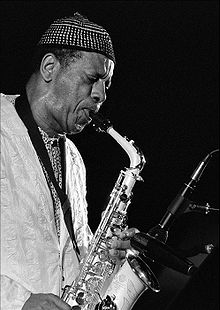
In the 1980s, albums like Virgin Beauty and Of Human Feelings continued to use rock and funk rhythms, sometimes called free funk. Jerry Garcia played guitar on three tracks from Coleman’s 1988 album Virgin Beauty: “Three Wishes”, “Singing in the Shower”, and “Desert Players”. Coleman joined the Grateful Dead on stage once in 1993 during “Space”, and stayed for “The Other One”, “Stella Blue”, Bobby Bland’s “Turn on Your Lovelight”, and the encore “Brokedown Palace”. Another collaboration was with guitarist Pat Metheny, with whom Coleman recorded Song X(1985); though released under Metheny’s name, Coleman was essentially co-leader (contributing all the compositions).
In 1990, the city of Reggio Emilia in Italy held a three-day “Portrait of the Artist” featuring a Coleman quartet with Cherry, Haden and Higgins. The festival also presented performances of his chamber music and the symphonic Skies of America.
In 1991, Coleman played on the soundtrack for David Cronenberg’s Naked Lunch; the orchestra was conducted by Howard Shore. It is notable among other things for including a rare sighting of Coleman playing a jazz standard: Thelonious Monk’s blues line “Misterioso”. Two 1972 (pre-electric) Coleman recordings, “Happy House” and “Foreigner in a Free Land” were used in Gus Van Sant’s 2000 Finding Forrester.
The mid-1990s saw a flurry of activity from Coleman: he released four records in 1995 and 1996, and for the first time in many years worked regularly with piano players (either Geri Allen or Joachim Kühn).
In September 2006 he released a live album titled Sound Grammar with his newest quartet (Denardo drumming and two bassists, Gregory Cohen and Tony Falanga). This was his first album of new material in ten years, and was recorded in Germany in 2005. It won the 2007 Pulitzer Prize for music, Coleman being only the second jazz artist to win the prize.
Jazz pianist Joanne Brackeen (who had only briefly studied music as a child) stated in an interview with Marian McPartland that Coleman had been mentoring her and giving her semi-formal music lessons in recent years.
Coleman continued to push himself into unusual playing situations, often with much younger musicians or musicians from radically different musical cultures. An increasing number of his compositions, while not ubiquitous, have become minor jazz standards, including “Lonely Woman”, “Peace”, “Turnaround”, “When Will the Blues Leave?”, “The Blessing”, “Law Years”, “What Reason Could I Give” and “I’ve Waited All My Life”. He has influenced virtually every saxophonist of a modern disposition, and nearly every such jazz musician, of the generation that followed him. His songs have proven endlessly malleable: pianists such as Paul Bley and Paul Plimley have managed to turn them to their purposes; John Zorn recorded Spy vs Spy (1989), an album of extremely loud, fast, and abrupt versions of Coleman songs. Finnish jazz singer Carola covered Coleman’s “Lonely Woman” and there have even been progressive bluegrass versions of Coleman tunes (by Richard Greene).
Coleman married poet Jayne Cortez in 1954. The couple divorced in 1964. They had one son, Denardo, born in 1956, who became a notable jazz drummer in his own right.
Coleman died of a cardiac arrest at the age of 85 in New York City on June 11, 2015. His funeral was a three-hour event with performances and speeches by several of his collaborators and contemporaries.
